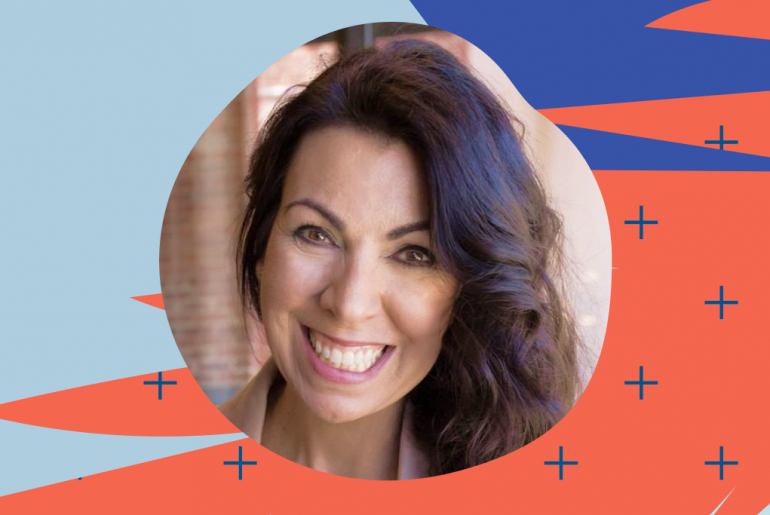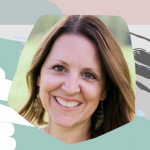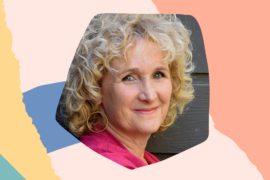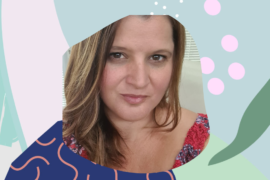As a professional speaker, Laurie-Ann Murabito spent much of her time flying all over the world, but years of travel left her frustrated, lonely, and exhausted. As the travel got harder, she started looking for a new way to help her fall back in love with her work.
Soon, a client gave her exactly that. Now, at Speak and Stand Out, she teaches others how to get booked (and get paid) to speak. She shows her members how to craft a compelling story, engage an audience, and deliver their expertise in style, so they can grow their business effortlessly.
Laurie-Ann is here today to share the story of how she avoided burnout by using her gifts to empower others, how to transfer your talent into other fields without making sacrifices, and to talk about the art of public speaking.
KEY TAKEAWAYS
- How the stress and exhaustion of travel led Laurie-Ann to explore a new way forward using the membership model.
- The client inquiry that opened Laurie-Ann’s eyes to her new business model.
- How to practice presenting to an audience in a low-stakes way.
- How Laurie-Ann conquered her fears and launched using a live Q&A without an expensive copywriter.
- Laurie-Ann’s quick lessons for anyone who has to speak for work, no matter what you do.
Free Give
FREE Guide – Launch & Grow a Profitable Membership Site
Ready to reclaim your time and attract more monthly paying customers? Our step-by-step guide will show you how to build a membership site that turns your passion into recurring profit. Click here to download!
Memorable Quote
- “When you get outside of yourself and more into serving your audience, that’s what it’s about. It’s about them.” – Laurie-Ann Murabito
- “When you overteach, you overwhelm your audience and then they walk out of the room and they don’t do anything” – Laurie-Ann Murabito
EPISODE RESOURCES
Transcript
Read The Transcript
[INTERVIEW] Shelli Varela: Laurie-Ann Murabito, welcome to the It’s a TRIBE Thing Podcast. Laurie-Ann Murabito: Thank you. So excited to be here. Shelli Varela: I am excited to speak to you as I am, all of our guests but I do enjoy speaking myself so I’m really excited to be able to share with our people not only your membership site journey but for those speakers and aspiring speakers, what that sort of looked like for you and how your membership site can serve those kinds of people. But having said that, if you can share our journey with the audience or your journey with the audience with respect to you were a professional speaker and you were on planes all of the time, how did that feel? What was that life like? And how did you end up being the person who now teaches the same thing in a membership site capacity? Laurie-Ann Murabito: Well, jumping on airplanes and speaking for somebody else’s audience, whatever size that was, it just became exhausting. I became an entrepreneur so that I could work for myself and not be trading time for dollars and, essentially, I was punching the clock. Whatever my speaker fee was, it started the day before when I got on a plane and there were times where especially during conference season, where it’s like I didn’t even unpack my suitcase. I just washed my clothes and jumped on a plane a couple of days later and it is exhausting to travel. I went from that and I just decided like there’s got to be a better way, a better way for me to share what I, I guess, I was looking for something different, a different business model, and I didn’t really know what that was. And it was very frustrating because like you show up at somebody’s conference and you got your smile on your face and you hold the microphone, you get up there on stage, but then it’s tiring. It’s lonely. It’s very lonely on the road. Shelli Varela: That’s interesting, not the loneliness piece, but the fact that you get into speaking because you want to make a difference because you want to move people and touch people’s hearts, you want to be able to create some sort of transformation or switch them on in some capacity. And so, with that comes as a speaker the desire to create the impact and to make that difference for those people. What was that like for you? Because for you to be able to make that impact for those people, first of all, was limited to whatever audience you happen to be sitting in front of geographically. And also, the fact that you had to spend basically three days to do an hour talk like if you’re flying into an event, it’s the day before getting there, prepping, getting settled, doing your talk and then getting home and getting back into life. What was that piece like for you? Laurie-Ann Murabito: Exhausting, just exhausting. And there was this one phase where I kept going to the West Coast. So, it was like a day out there, two days out there, a day that you fly home and it’s just exhaustion and then it’s jet lag. And like to get over jet lag pretty darn quick so that you are speaking at 9 a.m. the next day is it’s a lot of discipline. Shelli Varela: Well, that’s interesting. You say that it’s not only just the schedule and how exhausting it is like your self-care and the process must have been because the rub is you’re a really successful speaker but the other side of that is you’re a really successful speaker so you’re in demand and they want you on those planes, they want you at those events. What was that like for you and your self-care? Laurie-Ann Murabito: I love to exercise and eat right and drink lots of water, but when you’re on the road, that’s really tough, especially if you’re going to the dinners with clients depending on like if it’s just like some sort of like an arranged dinner, you’re at the mercy of whatever’s there. It’s not great. A lot of rushing, a lot of rushing from place to place, and then sometimes you’re just rushing to wait. Shelli Varela: Oh, that’s the worst. So, at what point did you reach like a fulcrum where you’re thinking to yourself, “This isn’t fun and I’m not sure if I am called to do something bigger or different.” What did that transition look like for you? Laurie-Ann Murabito: That transition for me looked like that travel was getting harder and harder. There’s lots of breaches of safety that was going on. I mean, I still love to travel but there are just too many instances and it was a particular incident that happened and it just bothered me enough to say, “There’s got to be something else for me. There’s got to be a different way for me to impact other people.” Shelli Varela: Did you ever think about giving up on what you do? Laurie-Ann Murabito: Not necessarily. Shelli Varela: You were just searching for a better way to… Laurie-Ann Murabito: Searching for a different – I just kept saying there’s got to be a different business model. There has got to be something different. There’s got to be another way for me to fall in love with my work again. Shelli Varela: That’s a beautiful statement. Laurie-Ann Murabito: That’s what I was looking for. I wanted to fall in love with what I was doing again. Shelli Varela: So, you had mentioned in our chat previous to this you had a meeting and somebody asked you, “Can you help me write my speech?” Tell us about that day. Laurie-Ann Murabito: So, I get this e-mail from a woman who says, “Laurie-Ann, do you write speeches for people?” And like in my head I’m just like, “No.” But she’s heard me speak a couple of times. I knew who she was and I was like, “Let me sit down with you.” And after sitting down with her and understanding where she was in the struggle with her business, I was like, “Oh, what I know, I know how to write a speech and I can teach you how to write a speech. I can teach you how to get booked, and I can teach you how to leverage those opportunities into a whole lot more.” And I fell in love with helping her and after her first speech, she had a home run. Shelli Varela: That’s the best. Laurie-Ann Murabito: Yes. And that’s when I was like, “Huh, if she really benefited from this information, I wonder other people would want to know what I know?” And that’s what opened the door. That was the new business model. That was what I was looking for. That was something new. I fell in love with helping her and I was like, “I love this.” Shelli Varela: What’s funny, when you have a gift for something, you don’t even realize it’s a thing, oftentimes, and so many of our listeners will be having the same experience. There have been many times in my life as well when people say, “Oh, can you tell me more about that?” And I’m like, “The things that come naturally to you sort of dismiss them as well. Can’t everybody do this or doesn’t everybody know?” But I love those moments like you just described, when you share your gift and then you watch somebody gets switched on and you think, “Oh, I have the ability to not only help somebody but to potentially change their life and their business.” Laurie-Ann Murabito: Yes. Here’s a fun fact about me. I’m a reformed painfully shy girl, like couldn’t make eye contact with people. And so, I’m now teaching other people like I went from not being able to make eye contact to getting on stages. So, a lot of people who are like, “But I’m afraid of speaking.” “Yeah, I understand. Me too at one point.” Shelli Varela: That’s amazing. Also, I did a TED talk and people think, “Oh, you just kind of roll on the stage and do a TED talk.” I had to do therapy before I got on because to your point, there’s the things that you execute on as a speaker that are technical, that are scripted, that are performance-based, skill-based, but there’s also the other half of that. There is a human being giving the speech who oftentimes is terrified. Can you talk about because it sounds like you probably do things in a slightly different way than many speechwriters or speech therapists, if you will, in terms of holistically writing the talk and helping with the execution of it, but also firsthand, having the knowledge and the experience of what that feels like and how you got through it. Laurie-Ann Murabito: Well, one of the things that there’s always that question of, “Should I memorize my speech or should I just wing it?” And I always tell my clients, there’s two parts that you should memorize, the beginning and your close. And the reason for the beginning is because that’s when you usually have butterflies. And if you know what you’re going to say, for the first few minutes, then the butterflies just kind of come down and then you can take the rest of the performance as you call it because it is a performance, the rest of your presentation, your keynote, your workshop, and then your close. And the reason why I suggest to people that they memorize their close so that they close, give their call to action, and they never run out of time. They know exactly how long it takes. Shelli Varela: Exactly, yeah. Laurie-Ann Murabito: And some people who are terrified, I’m like, “Well, then let’s start small. Bring some friends over to your living room. Start doing Facebook Lives in a closed group even just for yourself.” All of those little things add up. Shelli Varela: That’s a great tip because the digital stage is still a stage. Laurie-Ann Murabito: Yes. There are so many forms of speaking. Shelli Varela: Yeah. And then the ability to be vulnerable and put yourself out there. So, when you started realizing there may be a different or better way to do this, you had worked with one-on-one clients. What was the point at which you realized, “I think maybe a membership site might be for me?” And tell us the story about the almost not launch of your first membership site. Laurie-Ann Murabito: So, you get to a point where it’s like I know what my magic number is for one-on-one clients for my amount of energy, for the time that I have. And so, when you get like full and you’re at capacity, you can only have people on a waiting list for so long, and like little workshops. And so, I knew that there was another way that I wanted to impact more people. I wanted to share my knowledge with a whole lot more people than I was currently. And so, the idea of doing a membership, so I did a challenge, so I guess we’re calling it, I did a challenge launch and it started on a Monday and come Wednesday I was like, “Umm, I’m not sure what I should be pitching on Friday.” With thought of a membership like, “Okay, but maybe I should just like go the safe route and just pitch my coaching.” Shelli Varela: Tell me what you were scared of during that period of time. Laurie-Ann Murabito: In all honesty, I was scared of being judged. I’m scared that it wouldn’t work. What if nobody signed up? What would people think? Like, all that imposter syndrome comes up like who are you to be teaching me this stuff? And I just decided to just have faith. I was like, “I made the decision,” and I was like, “I made the decision once.” I was like, “Okay, I’m going to launch the membership site on Friday.” And this was literally like on Wednesday, two days before I’m going to pitch this, I decide, “Okay, I’m going to pitch the membership site, deep breath.” That’s on Friday. Friday morning, I wake up and I’m like, “Oh, I might need a sales page.” So, there I am pecking away on my computer making a sales page so that when I pitched it, they had someplace to go so they could sign up. And I had to announce like, “When you go to the sales page, there’s probably spelling errors and grammar mistakes,” and just go, “I made it this morning. No copywriter, no nothing. It was just I put it together.” And I guess what said, “Yes, you’re on the right track,” was while I was pitching, while I was sharing this idea because it was really just like a live Q&A call at the end of the challenge, people were signing up right on the call. Shelli Varela: Wow. Laurie-Ann Murabito: Yeah. And that was the, “Oh wow. This is what people want. They want this next step.” Shelli Varela: That’s incredible. For those people who are listening who are maybe in a similar situation and given that you help people with things like their nerves and getting on that stage, for you, what was the thing that had you leap off the ledge when you’re thinking, “I want to start a membership site. I’m afraid of being judged that nobody will sign up.” What was the one thing that allowed you to say, “Yes, I’m doing it?” Laurie-Ann Murabito: When you get outside of yourself and more into serving your audience, that’s what it’s about. It’s about them. When you start worrying about judgment, you’re too focused on yourself, and what do I look like, versus what do they need? How can I help these people? And that’s like once I made the decision, I was just like, “Can’t go back. Can’t go back. It’s going to be of service to these people and let’s see what they want.” Shelli Varela: Fantastic. So, now that you have a membership site and you did jump off the ledge and you are serving these people, what’s been your best piece of feedback or information that you’ve gotten back from some of the people that you work directly with? Laurie-Ann Murabito: They are loving it. They love the live Q&A calls, the spontaneous like Facebook Lives that I do within the group. They love the little bits and pieces of information and really, it’s just helping them move along quicker than if they were like trying to do it on their own and they’ve got a community of people that are helping them. That’s the fun part. Shelli Varela: Well, we’ve been talking about community and membership sites and how that is just as important or more important than the topic of the membership site. So, to your point, imagine you have a group full of speakers and aspiring speakers, all experiencing the same amount of nerves. If you want to accomplish something and you want to share that message, you have to get on a stage but the thing is without that community and without that membership site, they may be voicing those fears to other people who would initially say like, “No, don’t get on the stage,” because they’re not in the position to be pursuing something or creating an impact in the world. So, just by virtue of you creating that supportive environment where people in that community are heading in the same direction, they believe what each other believes, and they hold each other up and accountable, that by and large is one of the biggest reasons that people are able to get the traction and make the transformation not only for themselves but also for the people that they serve. Laurie-Ann Murabito: Absolutely. And I have like an array of people, people who work for companies and know that speaking helps with their careers, people that just want to be professional speakers and others that they’re entrepreneurs and using speaking to grow their business, and it’s like all of these people are working together and encouraging each other. And like here’s an idea and here’s a tip and here’s a question and people have told me like the community is so much fun. Shelli Varela: I love that too because it is really true we’re better together and if you can learn from somebody else’s experience, I always liken it to at the firehall we’ll have rookies that will come on and it’s not possible for them to experience everything but in our particular case and in many other cases, your life depends on it or sometimes feels like it does. So, when you can share, “Hey, here’s a tip I learned that you may or may not account for or you may or may not encounter,” but it allows you to have so much more comfort and ease knowing that you’ve foreseen problems that you may not have even thought of otherwise. Laurie-Ann Murabito: Absolutely. Absolutely. Shelli Varela: Well, since we have the privilege of having you on here, I’m wondering if you can offer the listeners any tips or tricks on speaking in terms of, in your opinion, what is the commonalities between somebody who will hit it over the fence and some people who maybe fall flat in a way that they didn’t mean to? Laurie-Ann Murabito: Okay. So, I would say be yourself because you’re an expert on being yourself and don’t overteach. That’s a big one. When you overteach, you overwhelm your audience and then they walk out of the room and they don’t do anything or on the Facebook Live, they like walk away and they don’t do anything because they’re too overwhelmed and too confused. And I would say like I’ll give you a third tip and there’s power in pausing. And there’s a scientific reason why speakers pause and that’s because usually, it’s to give the audience member, to give the listener space to think, space to answer the question, space to just like have a unique thought or like, “Huh, I wonder how to apply that to my particular life.” Shelli Varela: So powerful. Yeah, it’s kind of like music. The notes are imperative, but so is the space between the notes. Laurie-Ann Murabito: I love that. Thank you for sharing that one. Shelli Varela: If people are looking for you online, where is the best place they can find you? Laurie-Ann Murabito: They can find me at SpeakAndStandOut.com. Shelli Varela: Amazing. Thank you so much for your time. Laurie-Ann Murabito: Thank you. [END]
To learn more and get access to all episodes, visit our podcast page!






